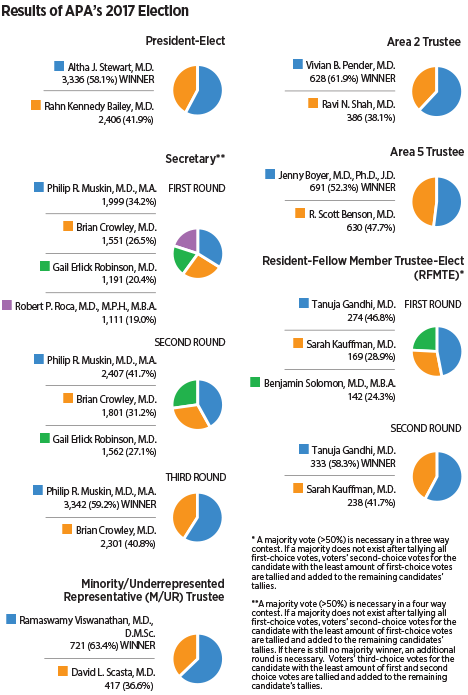Stewart Chosen APA’s Next President-Elect
Abstract
APA members have selected the current secretary as the next person in line to hold APA’s highest elected leadership position.
APA’s voting members have selected Altha Stewart, M.D., of Memphis to become APA’s next president-elect. Stewart ran against Rahn Bailey, M.D., of Winston-Salem, N.C.

Altha Stewart, M.D. (right), will become president-elect of APA at the end of APA’s Annual Meeting in May, when Anita Everett, M.D., becomes president.
Stewart, currently APA’s secretary, is an associate professor of psychiatry and director of the Center for Health in Justice Involved Youth at the University of Tennessee Health Science Center in Memphis. Her career has spanned three decades of public sector administration, including director of public behavioral health systems in Michigan, New York, and Pennsylvania.
Bailey is the executive director and chair of the Department of Psychiatry and Behavioral Medicine at Wake Forest School of Medicine. Highly involved with APA since 1995, he is the chair of the Membership Committee and the black psychiatrists representative to the Assembly Committee of Representatives of Minority/Underrepresented Groups.
Stewart is the first African American to be chosen for APA’s presidency in its 172-year history.
“Much is being made of the historical nature of this election,” Stewart told Psychiatric News, “so of course I feel a certain sense of obligation as the first elected president whose identity represents the intersection of race and gender to facilitate discussions in the organization regarding those issues. Hopefully that will inform some of the decisions we make during my term in ways that will further APA’s goals in the areas of diversity and inclusiveness.”

Asked about what she expects to be her major priorities as APA’s president, she responded, “I believe we must identify opportunities for APA to work on addressing the disparities in patient care and physician compensation facing those we serve and the profession. The uncertainty about the future of the Affordable Care Act must be closely monitored by APA to assure we oppose any loss of the gains achieved for psychiatric patients with its implementation.”
To meet these challenges, she said, APA needs to continue building and maintaining coalitions with other stakeholders, including patients and families and other medical specialty organizations.
Noting that the future of psychiatry depends on its young members, she aims to engage with resident-fellow members and early career psychiatrists to assure their full participation in the organization and create a path to leadership succession that secures the future of the field.
Stewart is mindful of the many concerns that APA members have in this changing political and economic environment and the need to take vigorous action. Among the issues she will be putting on the front burner are the “significant financial and time burden of the current MOC requirements, physician burnout, the need for less restrictive regulations, implementation of full parity, the need for APA to address mental health issues related to climate change, and patient concerns/reactions coming into treatment settings that are related to the changing political climate nationally.”
In the race for secretary, Philip R. Muskin, M.D., M.A., of New York City emerged the winner. His opponents were Gail Robinson, M.D., of Toronto, Ontario and Robert Roca, M.D., M.P.H., of Baltimore.
In the race for minority/underrepresented representative (M/UR) trustee, Ramaswamy Viswanathan, M.D., D.Sc., of Brooklyn, N.Y., defeated David Scasta, M.D., of Milford, Pa.
In the race for Area 2 trustee, Vivian Pender, M.D., of New York City won over Ravi N. Shah, M.D., M.B.A., of New York City.
In the race for Area 5 trustee, Jenny Boyer, M.D., Ph.D., J.D., defeated R. Scott Benson, M.D.
Each year the Association’s resident-fellow members elect a resident-fellow member trustee-elect, who the following year rotates into the position of resident-fellow member trustee. The winner of this year’s race is Tanuja Gandhi, M.D., a forensic fellow at Yale University. His opponents were Sarah Kauffman, M.D., a PGY-2 at Columbia University, and Benjamin Solomon, M.D., M.B.A., a PGY-2 at NYU Langone Medical Center.
Election results were approved by the Tellers Committee in February, but the results will not be official until after the Board of Trustees reviews them at its meeting this month. All of the winning candidates will assume their positions on the Board at the close of the Annual Meeting in May. ■



